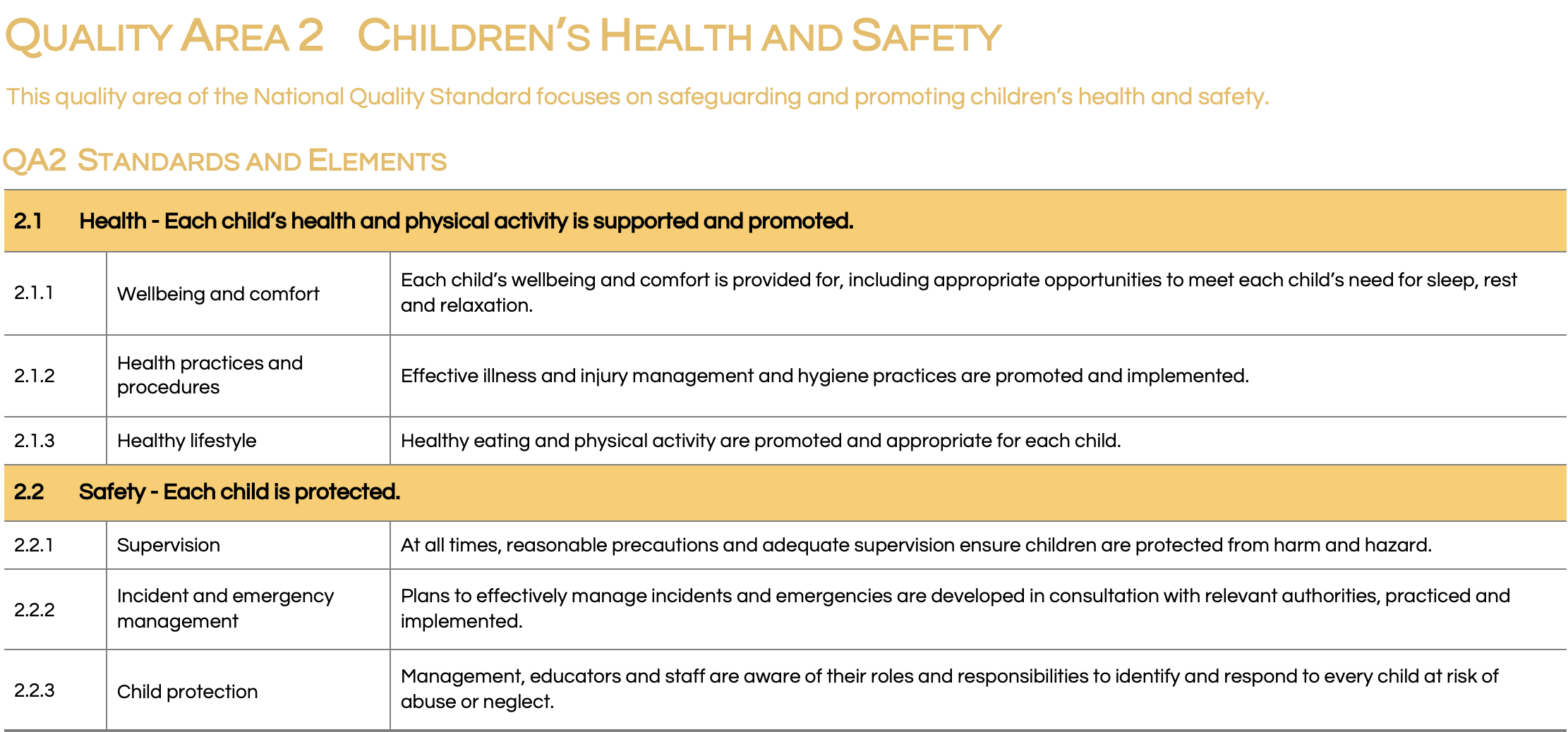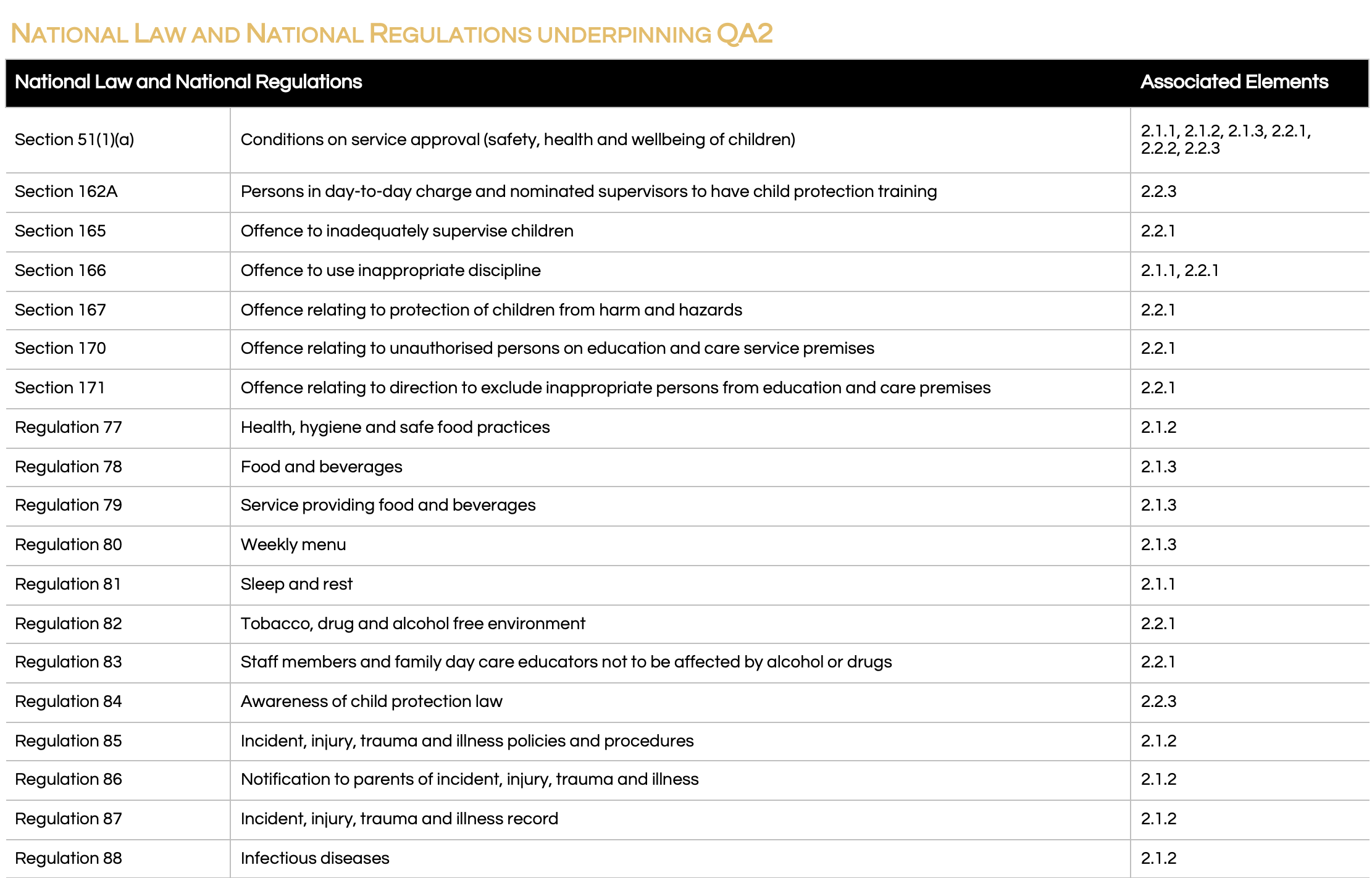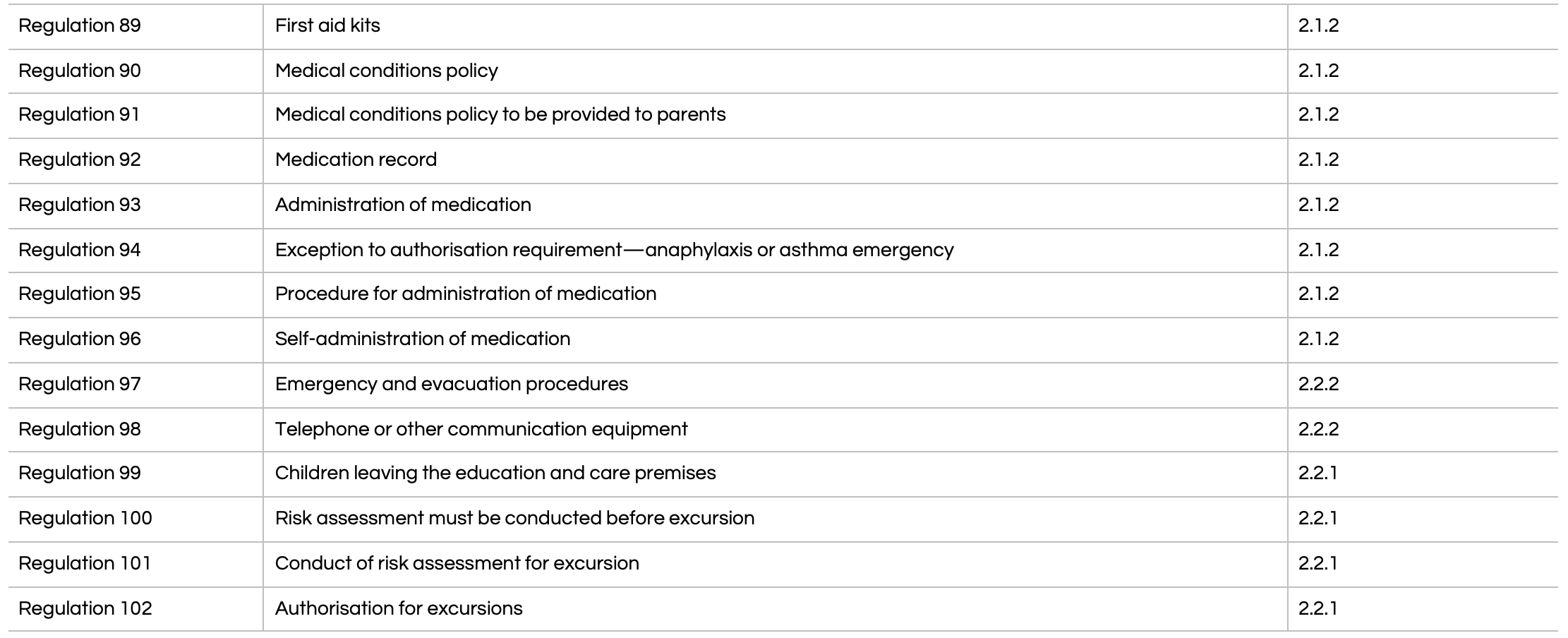Our QA2 Strengths
Our Team are aware of those Small Friend’s who have allergy and /or medical condition as notified by parents on enrolment. This information is added to our allergy and medical posters, which are on display in the kitchen, dining room and laundry. These posters are updated regularly to accommodate changes in a child’s booked sessions, allergy severity and/or treatment plan. Daily medication for children is noted on signed medication forms by the parent and dosage information is displayed on our medication whiteboard in the kitchen. Long term or regular medication is recorded and kept in our ongoing medication folder in the kitchen.
Our Small Friends are taught and encouraged to follow hygiene procedures while using the toilet; having their nappy changed and when they blow their nose and/or have a cough. Washing hands is encouraged throughout the day when children have blown their nose or coughed into their hands; during play if needed; after art activities or after spending time with our pets. All children wash their hands before each of our 3 meals.
We encourage healthy eating during all meals with fruit and vegetables being offered for morning and afternoon snacks and our Small Friends encouraged to make healthy choices from their lunch box . Healthy lunch choices are encouraged, with children eating the everyday foods from their lunch box before any sometimes foods. So their sandwich or the sandwich alternative they have in their lunchbox is always first, fruit, vegetable and dairy to follow, with ‘treats’ or sometimes food (if they have them) being eaten last. We encourage parents to fill drink bottles with water only, no flavoured drinks. Children leave their drink bottles on our water trolley which is always ‘parked’ we were are in the house or backyard so that they have easy access to their own bottle throughout the day.
Our Small Friends are given lots of opportunities to play outside throughout the day to participate in individual or group activities and games that encourage, support and challenge them to use their gross motor skills in a safe and engaging environment.
We organise safety and health incursions in the form of visits from members of the community i.e. Fire and Rescue, a Nurse, Paramedic, and/or Dentist to talk with the children about their own health and safety at school and home.
Practice Is Embedded In Service Operations
Our Space
Our house and backyard is set up to provide spaces for quiet more restful moments and spaces for active play, giving all children the choice of what their bodies and minds wish to commit to at any given moment of their day.
Relaxation and mindfulness activities are incorporated into the daily program the children partake in Rest and Relaxation after lunch. Pillows and blankets are available to support children who use these to help comfort them during these times.
Visual reinforcement of hand washing is displayed in the children’s bathroom.
Plastic gloves, wipes, antibacterial hand gel is supplied for changing and first aid use.
Our house is cleaned daily by cleaner, and our Team communicates directly with her in regard to any areas that may need special attention.
Outside equipment is checked daily and any issues logged on whole of site hazard processes. Any urgent issues are reported directly to Natassja.
Our first aid kits is available in the laundry; medicines are kept in our kitchen cupboard, and health care plans and allergy notes are displayed for all Team members to see in the kitchen, change area and dining room.
Fire extinguishers are located in the kitchen and laundry.
Our Small Friends
General Health Safe behaviours regarding hygiene, washing hands, sun safety, moving and interacting safely are taught to our Small Friends and are, regularly reinforced and modelled by our Team at all times.
As part of meal time routines our Team and children are to wash their hands. Visual reinforcement of hand washing is displayed in our bathrooms, with hand soap available at each sink, and hand towel units adjacent to the sinks. The children are taught and reminded regularly on how to use everything.
Tissues are accessible to everyone and as role models our Team actively encourage and constantly show our Small Friends how to use tissues correctly and how to dispose of them in our house.
Sun safe hats are provided, and we have a No Hat No Play policy when we’re outside as part of our sun smart policy. In warmer months families are asked to apply sunscreen before dropping off their Small Friend, then during the day with the assistance of out Team our Small Friends will apply sunscreen when required through the day dependent on the UV reading. Parents are asked on enrolment and reminded throughout the year to dress their child/children in sun smart clothing, and if they are not then the child/children will need to wear one of our Small Friends Housemates Tees while they’re in our house for the day.
Gross motor skills are supported by intentional choices of equipment set up for outside play. These activities allow the children to challenge themselves or test their confidence, with our Team on hand to give support. Covered areas provide protection for play to continue in wet weather as well as sun protection in summer.
Fine motor skills are incorporated in a wide range of activities providing options for individual choice, capabilities and scope for improvement. Fine motor activities are also included in outside play areas.
Mealtimes Families are asked to only provide water only, sugary drinks are not accepted. Our Small Friends have access to their water bottles all day, and are constantly encouraged to drink throughout their day of play and at meal times. Bottles are refilled as needed, and Small Friends who forget their drink bottle are provided with one of our spare house bottles to use for the day.
Families are to provide a piece of fruit or a vegetable to be shared for morning and afternoon tea, and healthy lunches are encouraged and is part of our learning program. Posters and information sheets regarding for what we prefer to see in lunchboxes are communicated to families on enrolment; shared as reminders throughout the year, and displayed in our house.
Our Team
General Health & First Aid Our Team are supportive, caring and respectful when supporting our Small Friends with toileting routines and changing of clothing, and each child’s privacy and dignity is respected at all times. If applicable our Team are aware of cultural clothing choices and when they need to be mindful of a particular clothing item.
Our Small Friends comfort and wellbeing is supported by everyone on our Team in a positive and caring manner, and especially when a Small Friends is seeking a quieter time during their day.
Every Team member knows how to access our first aid kit and how first aid responses are to be recorded. Follow up conversations with families occur in the event of any incident where first aid has needed to be applied. There is always someone on site with the appropriate level of First Aid, Asthma and Anaphylaxis training certificates. All of our permanent and casual staff are required to hold current first aid qualifications, a cost that is covered by our Owner Natassja.
When medications are needed to be administrated whether they be a one off administration or ongoing, Management Team members work through the process which includes ensuring that all documentation is completed by the family. Any medications required to be stored in our house is stored safely as per the mediation instructions.
Emergency medication, health care plans for children are developed and recorded as needed. Our Team are made aware of any changes to health care plans and the plans are brought to the attention of our Relief Team.
Our Team follow Department of Health WA policies in responding to infectious disease.
Our Team sits with our Small Friends at meal times, during which time they promote healthy and safe eating practices. Morning and afternoon tea including our platers of shared fruit and vegetables gives the children the opportunities to try new healthy choices brought along by other children.
Safety of Our Small Friends A locked labelled locker in our laundry holds hazardous materials, the door to the laundry also has a two-way lock which is engaged at all times throughout the day.
Should Team members need to move through the house and away from spots of supervision to either assist a Small Friend or carry out a task, they are to inform their colleagues to tag out and in
Hazards and risks are recorded, assessed and actioned as per procedures. A daily WHS checks of the house and yard are conducted by staff and noted on our WHS checklist. Relevant action for any hazards identified is taken and recorded on our WHS checklist e.g. staff member removes hazard; log a house or yard issue that requires maintenance, etc.
Our Team inform Management directly in regard to any urgent risks or hazards, and every reasonable precaution is taken to protect children from harm with staff maintaining furniture, equipment, resources inside and being aware of the outside environment e.g. regular check and maintenance of climbing equipment, professional tree audit and bug spray inside and out as needed.
Plans to manage incidents and emergencies include evacuation/lockdown procedures and are displayed within the house. Our Small Friends are involved in drills each term and learn how to react and be part of the correct procedures to stay safe. Family contact details are available in printed and online format for access in the case of an emergency, with a copy in the Evacuation Box to be accessed in the case of an emergency.
All of our Team are aware of their responsibilities that as qualified Educators they are expected and will be fully supported should they need to make a notification as a Mandatory Reporters of sexual abuse from November 2024. Staff are aware that with this being part of their job description that they will commit to annual refresher training so that they are always aware of their obligations should they need to take on this role. Records of Mandatory Notifications are kept securely in the office.
Practice Is Informed By Critical Reflection
Policies, practices and approaches to manage our Small Friends health and wellbeing needs are continually reviewed and updated as scheduled e.g. policy reviews in staff meetings, or as required e.g. enrolment of a child with specific medical need.
Our Team are aware of and considerate of individual health and wellbeing needs, and these are reflected in our program (e.g. ensuring all children can access resources needed) and learning environment, e.g. spaces to be away from noise and stimulus, and routines e.g. opportunities for our Small Friends to have a sleep after lunch if they need it.
Routines, transitions and learning activities are adapted to meet the wellbeing and health of all children in our house. For example, changes to daily routines due to inclement weather will always be made to ensure the children’s comfort or needs are met effectively.
Our Team conduct risk assessment for incursions and other learning opportunities as required.
Emergency management procedures are practiced and reflected upon after scheduled events to ensure any required changes or training can be made.
Practice Is Shaped By Meaningful Engagement With Families, And/Or Community.
Children’s health and dietary needs are supported by collecting information from families at the time of enrolment, and our Team support children with regard to their food choices whether it be for dietary needs and/or the cultural beliefs.
Children are encouraged to eat healthy options at meal times, and respectful conversations occur with families if there are ongoing concerns with the level of unhealthy food children are bringing in for lunch.
Many families need ongoing support to seek medical advice and health and learning support for their children. Natassja will do all that she can to support these families in accessing assistance from support services such as WANSLEA and/or health professionals in the area. We will always support children and families should a child need a health professional such as a Therapist or Psychologist to attend our services, and we encourage therapy sessions to be conducted in our house whenever possible as we believe this level of assistance for a child in our space is a functional application of health professional services.
Each Team member is aware of and sensitive to the traumas some our Small Friends have or are experiencing and take this into consideration when ensuring each Small Friends feels safe whilst in in our care, especially if there something in their life is unsettling them that is beyond our doors. This understanding may include being aware of any situations at home that families are comfortable disclosing to us that may see a change in a child’s behaviour and/or demeanour.




